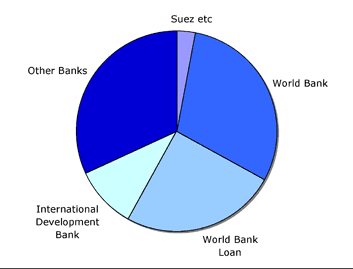Foreign investment is supposed to provide developing countries with much needed capital. However, the extent to which this foreign investment makes additional capital available for infrastructure development is questionable. Where full privatisation has taken place, rather than financing new investments and infrastructure, foreign direct investment (FDI) is increasingly going into mergers and acquisitions of existing enterprises. In fact between half and two thirds of FDI worldwide consists of such  mergers and acquisitions. This has also occurred in Asia since the Asian crisis.
mergers and acquisitions. This has also occurred in Asia since the Asian crisis.
A 2004 Asian Development Bank (ADB) study of 18 Asian cities found that where water had been privatised, in Manila and Jakarta water supply coverage, sewerage access, investment and leakage were worse, and only revenue collection efficiency and minimising staff were better than other cities.
| Selected Water Indicators | Manila (private) |
Jakarta (private) |
Average of 18 cities (public) |
|---|---|---|---|
| Water Coverage (%) | 58 |
51 |
79 |
| Sewerage Access (%) | 7 |
2 |
51 |
| Non-revenue Water (%) | 62 |
51 |
34 |
| Capital Expend/Connection (US$) | 18 |
47 |
88 |
In developing countries the money from sales of government assets usually goes towards debt repayments whilst the private companies that do build new infrastructure bring little new private capital, because they too borrow most of the funds from the development banks. If these same funds were loaned to governments they would have the funds to finance water infrastructure themselves.
In Nairobi, Kenya, a Vivendi joint venture with an Israeli company for water supply agreed in 1999 was repealed n 2001. The contract not only increased rates by 40% but also required that Vivendi get 15% profit with virtually no investment, since equipment costs and upgrades were to be paid for by the government and users. The deal also included dismissal of 3500 workers whilst employing more highly paid experts causing the employment bill to rise by $2.2 million.
For example, the private consortium involved in the most expensive water privatisation, that of Buenos Aires, only contributed $30 million out of an initial investment of a billion dollars (see figure below).

Brazil’s debt has continued to climb along with its dependence on foreign capital. Foreign investors, who were happy enough to buy existing plants that had no remaining debt so that they could make quick returns on their money, were less interested in investing in new generation capacity, despite the price incentives provided by the high electricity rates. They demanded that 70 percent of any new project be financed by the Brazilian Development Bank; that the price for gas, which they favoured as a source of electricity, be guaranteed far into the future with long-term contracts; and that the Brazilian government take any losses resulting from a fall in the value of the Brazilian currency against the US dollar.
The remaining state-owned electricity companies had sufficient financial reserves to undertake the necessary investment, but were not authorised to do so as it would have been contrary to the World Bank imposed privatisation programme. Other cheaper measures such as improving transmission efficiency and energy conservation were not taken either. The Brazilian electricity system, which had worked reliably for decades before privatisation and had been admired and envied for its plenitude of cheap hydro-electricity, broke down and in 2001 Brazil faced such a shortage of electricity that rationing had to be implemented, causing economic and social disruption. Many transnational companies withdrew from the electricity sector at this point.
When Luiz Inacio Lula da Silva was elected he suspended privatisation of electricity in Brazil and brought some of the distribution companies back under public control.
Governments usually find that privatised public services end up being more expensive for them than financing their own schemes with loans. This is because they have to provide “cash contributions during the construction period; subsidies during the operation period, e.g. in the form of non-refundable grants; and a favourable tax regime – including tax holidays, refunding of tax on construction and operation costs.” The increasing demand for financial guarantees in terms of government guarantees for the private company loans and guarantees of profits (see Avoiding Risk), also end up being very expensive to the tax payers of poor countries.
In addition, loans to private companies are usually more expensive than loans to governments. In 2009, following the global financial crisis, independent power producers (IPPs) were paying 3 % more in interest that governments for loans.